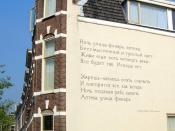'Poetry is a ceremonial form and ceremonies can help reconcile us to the aspects of our human experience which are themselves irreconcilable.' (Haslam & Turton) How do at least three of Hardy's poems about religion and agnosticism attempt to do this?
Ceremonies mark most rites of passage in our lives. Parties and festivals mark happier events while rituals and funerals occur at sadder times. As well as assisting the deceased's passing to an afterlife, these formal occasions also go to ameliorate the grief of those left behind. This is the 'irreconcilable aspect of human existence' to which the question refers. The formal structure (or 'ceremony') of poetry predisposed Hardy to this genre. Its intrinsic form allowed him to explore many of the dualistic tendencies he encountered in life (not least Darwin's theories versus religious orthodoxy) in a much freer and truer way than he felt he had been able to in his fiction.
Hardy spent his childhood as a believing Christian, changing to agnosticism in adulthood. Although seen through the eyes of a young girl, the poem In Church (338) to some extent re-lives this change. After the 'emotion' felt by an entire congregation in the first section, the illusion is shattered when the girl sees the priest mimicking the actions of the service in the vestry:
[She]
Sees her idol stand with a satisfied smile
And re-enact at the vestry glass
Each pulpit gesture in deaf-dumb-show.
The formal structure of the poem conveys the dramatic loss of innocence felt far more succinctly than a discussion ever could.
Hardy's scepticism over the existence of God is not as surprising as the fact that he still acknowledged that human beings needed a firm moral base if '...general barbarism and personal despair are not to prevail.' (Haslam & Turton, Religion section). This...


